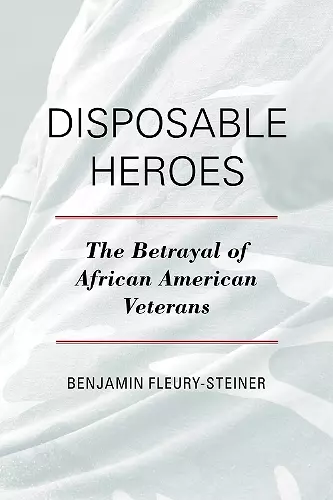Disposable Heroes
The Betrayal of African American Veterans
Benjamin Fleury-Steiner author
Format:Hardback
Publisher:Rowman & Littlefield
Published:16th Oct '12
Currently unavailable, and unfortunately no date known when it will be back

For many soldiers, the end of military service signals a cruel and new beginning. Disposable Heroes illuminates the challenges facing many veterans, particularly African Americans. Rather than finding military service to be a path to equality and upward mobility, these veterans fight just to survive. The book draws on in-depth interviews and national survey data to show the ways America is failing many black veterans today. Author Benjamin Fleury-Steiner shares the remarkable stories of 30 veterans from Vietnam to Iraq and Afghanistan. Their words illustrate the ongoing impact of explicit racial oppression such as Jim Crow segregation, white backlash against integration, and racially targeted criminal justice policies. The book traces the persistent role of racial inequalities in African American veterans’ lives before service, during active duty, and particularly after military life. Taken together, the stories in Disposable Heroes paint a compelling story of hope, struggle, and survival. Disposable Heroes makes a powerful case for ending America’s longstanding “war at home”—enduring unemployment, deficient health care, and substandard housing—that continue to plague many urban African American communities in the United States today, with particular attention to challenges of African American veterans.
The U.S. military has traditionally been seen as an avenue of economic advancement for African-Americans, especially low-income men seeking to escape poverty. Fleury-Steiner, a Gulf War veteran and a University of Delaware assistant professor of sociology and criminal justice, upends this truism in thirty searing oral histories from black veterans of Vietnam and subsequent conflicts, including Iraq. Instead of opportunity, these men, many of them from Wilmington, Delaware, found a military that mirrored the racism of civilian life and failed to provide even the basic training that would translate into better jobs after their tours of duty. The veterans interviewed often returned home to bleak circumstances exacerbated by the federal bureaucracy’s indifference to their health issues. The author intersperses these stories with details of his interviewees’ often difficult childhoods and family lives. Accounts from Vietnam veterans—'a forgotten bunch of fools' in the words of one vet—who came home to a hostile public and a health care system with a poor understanding of post-traumatic stress syndrome, dominate the book. Fleury-Steiner delivers a stinging indictment of the institution and society that continues to foist a barrage of indignities on African-American men. * Publishers Weekly *
It is not often that one reads an academic book and is transported into another world, where the words of research subjects dominate, and the stories are left bare to expose the raw, entangled webs that make up people’s lives. Benjamin Fleury-Steiner’s Disposable Heroes accomplishes this task in an eminently readable and engaging book that details how racism and poverty shape the lives of African-American veterans. * Law & Society Review *
An American tragedy of heroism and neglect revealed through the dramatic stories of African American veterans and delivered with a knock-out punch by Benjamin Fleury-Steiner. Disposable Heroes breaks out of framing veterans as psychological victims of PTSD, revealing instead how America’s institutions have betrayed but not defeated their resolve to survive with dignity. -- Michael Musheno, Berkeley Law, University of California and coauthor of Deployed: How Reservists Bear the Burden of Iraq
I am struck by the timeliness of this topic. Beyond what it tells us about the experiences of black veterans—before, during, and after their service—this book is revealing about American society and the state of black American in particular. This promises to be an important book. -- Edward Royce, Rollins College
Disposable Heroes brings a fresh approach to bear on a long-standing issue: how black veterans make sense of their military service, and the benefits their sacrifice should provide. Drawing on his own military service as a white veteran as a point of departure, Fleury-Steiner illustrates the ways in which race affects post-service social outcomes for black veterans. Black veterans' expectation of more equal treatment on the basis of their military service is almost never met, something that is an enduring source of frustration them. This is a must read for anyone interested in the intersection of race and military service. Disposable Heroes represents a solid contribution the under-studied area of the relationship between race, war, and citizenship. -- Christopher S. Parker, Stuart A. Scheingold Professor of Social Justice and Political Science, University of Washington
Disposable Heroes: The Betrayal of African-American Veterans is a story not simply about men who engaged conflict on the battlefield, but men who were conflicted about how much America cared about them even though they demonstrated the care or courage necessary for going into military conflict. This work is written is a prosaic style that lets the story come through and puts elaborate social scientific analysis aside. In doing so, Disposable Heroes takes readers on a journey from conflict as it was experienced on the battlefield to the racial conflict erupting at home in the late 1960s for Vietnam veterans, the economic conflicts for Gulf War veterans resulting from the dismal state of affairs for black Americans during these more recent times, and the emotional and social conflicts that many veterans experience as they strive to adapt to life after war. In talking about what they believe was denied them in making that adjustment, readers will understand that public celebrations at holidays and other times do not deliver anything close to what African-American veterans most need, which is to feel a sense of comfort and security with finding work, accessing secure states of physical and mental health, and truly believing that their service unquestionably affords them the chance to feel fully American. -- Alford Young Jr., Arthur F. Thurnau Professor and Chair of Sociology, University of Michigan
ISBN: 9781442217850
Dimensions: unknown
Weight: unknown
200 pages